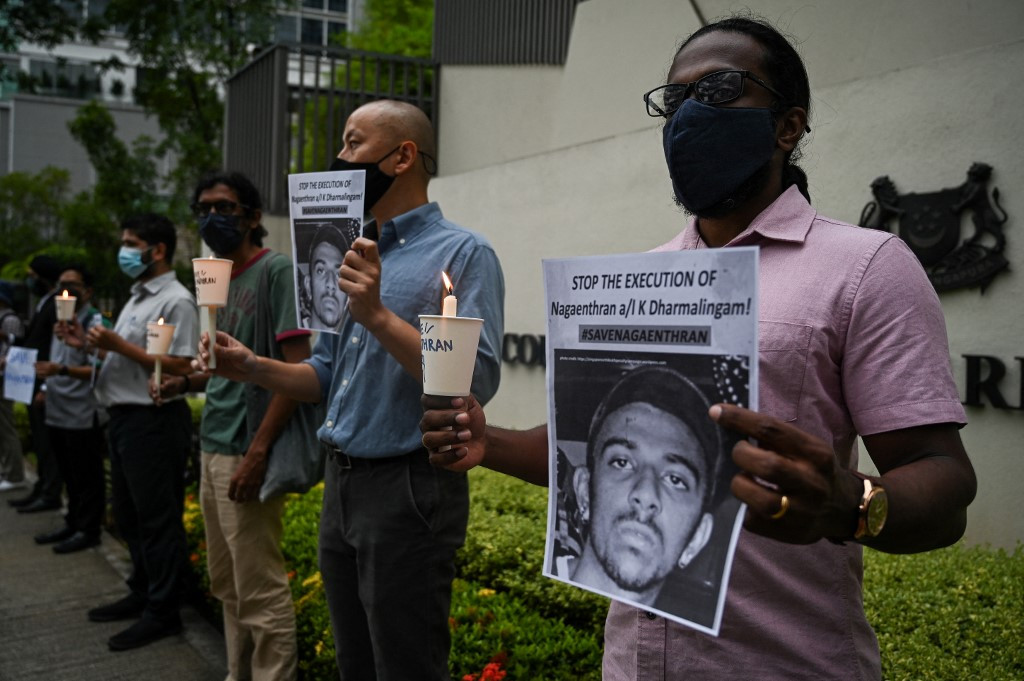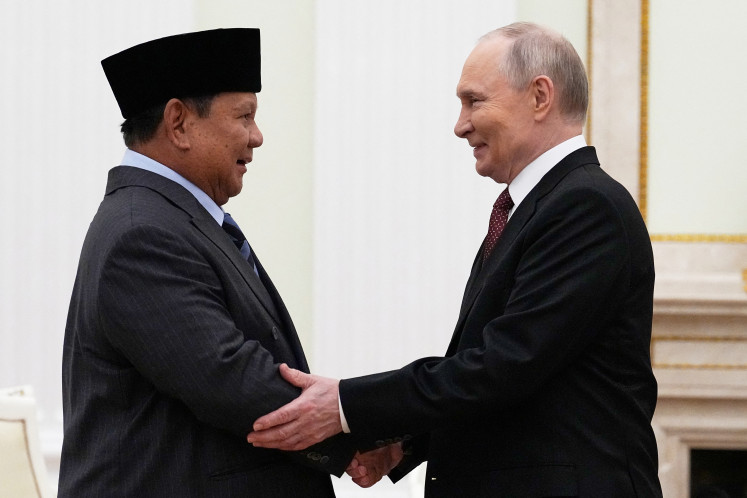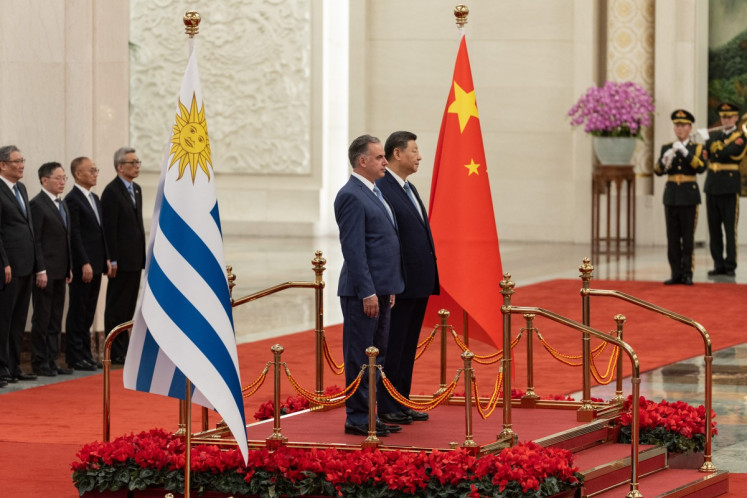Popular Reads
Top Results
Can't find what you're looking for?
View all search resultsPopular Reads
Top Results
Can't find what you're looking for?
View all search resultsEnding capital punishment is not a false hope
Hope could very well be the defining force behind the drive to abolish capital punishment: hope for redemption, hope for personal improvement, hope for national betterment, and above all, hope for humanity.
Change text size
Gift Premium Articles
to Anyone
 Activists hold up posters bearing a photo of Nagaenthran K. Dharmalingam during a candlelight vigil outside the Singaporean embassy in Kuala Lumpur on Nov. 8, 2021, to protest the death sentence handed down to the Malaysian national over a decade earlier for trafficking heroin into Singapore. Dharmalingam was executed at Changi Prison on April 27, 2022, aged 33. (AFP/Mohd. Rasfan)
Activists hold up posters bearing a photo of Nagaenthran K. Dharmalingam during a candlelight vigil outside the Singaporean embassy in Kuala Lumpur on Nov. 8, 2021, to protest the death sentence handed down to the Malaysian national over a decade earlier for trafficking heroin into Singapore. Dharmalingam was executed at Changi Prison on April 27, 2022, aged 33. (AFP/Mohd. Rasfan)
I
n August 2022, I wrote a piece about the death penalty that was published in this paper, based on an interview with Kokila Annamalai, an anti-capital punishment activist based in Singapore.
“We all know it is not easy to be a civil society activist in Singapore. It is even harder if you campaign against the death penalty with relentless determination and an overarching commitment to justice, together with the hope that things might one day change,” Kokila said, as quoted at the beginning of that opinion article.
The events that have unfolded in the last few months confirm the truth of these words.
Kokila has been at the center of a storm caused by the Singaporean government trying to silence her beliefs and convictions about the death penalty.
The controversy has turned into something far more tumultuous because she has refused to comply with a correction order, issued in October under the Protection from Online Falsehoods and Manipulation Act (POFMA), to “correct” her opinions on capital punishment.
Boldly, she is refusing to comply, and has become the first Singaporean citizen to do so. Her decision could cost her a substantial monetary fine and prison time, or both.
The POFMA was enacted to dispel and fight misinformation and falsehoods, but not opinions and beliefs. The legislation, however, has been weaponized by the ruling People’s Action Party (PAP) to silence dissent.
This is just the tip of the iceberg. For example, 15 Singaporeans are being investigated simply because they held vigils to mourn the deaths of two death row inmates, Rosman Abdullah and Masoud Rahimi Mehrzad, who were executed last year on Nov. 22 and 29, respectively.
The European Union, Norway, Switzerland and the United Kingdom issued a strongly worded statement to express their disapproval over their executions.
“The death penalty fails to act as a deterrent to crime and makes possible miscarriages of justice irreversible. Moreover, rehabilitation as an objective of modern criminal law is rendered impossible by the application of capital punishment,” read the EU statement.
While a number of nations around the world still support the death penalty, like Singapore and Indonesia, a shift is occurring.
On Dec. 17, Malaysia voted in favor of the 2024 United Nations General Assembly resolution for a moratorium on executions. This was a significant step and part of a recent pattern in Malaysia, which has been undertaking a serious process of rethinking its historical stance on capital punishment.
Singapore instead led a proposal to amend the same resolution, highlighting the “sovereignty” of nations in deciding their own course in judicial matters.
Here, I want to thank journalist Kirsten Han, who runs the online newsletter We, The Citizens, for helping readers worldwide to understand what’s going in Singapore.
Han, together with Kokila, is part of the Transformative Justice Collective (TJC), a group of activists in Singapore that are bravely pushing a counternarrative against capital punishment.
Back in October, TJC wanted to organize an initiative called Putting the Death Penalty on Trial to create more awareness on why it believes the death penalty is unjust and inhumane.
One of the initiative’s main events was a multimedia exhibition called “Fighting for Life”, but was not allowed to hold the event because it “undermines national interest”, according to a TJC release.
An article on the ruling PAP’s online publication Petir stated the following: “Perhaps when anti-death penalty activists stop their chase for virtue, they might start seeing drug traffickers for what they are. Scourge of the earth and proxy murderers who do not deserve our sympathy.”
I am wondering if, by extension, the same message would apply to all officials across the political spectrum in Europe who vehemently oppose capital punishment.
Would it also apply to outgoing United States President Joe Biden? He just fulfilled his promise of commuting all death sentences at the federal level, except in cases of terrorism and hate-motivated mass murder.
Despite being mocked by authorities at home, TJC is not giving up its fight, and is even doubling down instead.
Stop the Killing is TJC’s powerful new initiative, a petition calling for a moratorium on the use of the death penalty in Singapore. So far, 1,767 citizens of the island state have physically signed it.
Singapore should welcome people like Kokila, Han, Terry Xu and Thum Ping “PJ” Tjin, as well as many others. The reason is simple: They bring a different perspective that might be inconvenient for the PAP, but can help Singapore truly become a better place.
And now few words on the People’s Manifesto, which serves as powerful proof that there is a different type of Singapore and a different type of citizenry that dare to dream about a better nation.
Launched in August 2024, the manifesto is an attempt to show there is an independent civil society that wants some bold changes.
The first chapter is titled “To (Re)build a Democratic Society” and opens with: “Dissent and contestation are healthy, generative features of a democracy. No single person, group or political party has a monopoly on wisdom about how a country should be run.”
I wrapped up my August 2022 piece in the following way: “Wong needs to muster the courage to discuss openly and transparently about the death penalty and the real possibility that his country needs a new narrative,” referring to Lawrence Wong, who was then deputy prime minister.
We truly need more transformative justice, and not just in Singapore.
Criminals, while they must be held accountable, can redeem themselves and, even if they are behind bars for their remaining days, can become better. And let’s not forget that real justice is also about forgiveness; something that is too often and too conveniently ignored.
Han recently delivered a public lecture in Western Australia titled “Singapore Must Always Have Hope”. Indeed, the PAP and Prime Minister Wong should also have hope.
Hope beats fear and dogmatism, brings in new possibilities and enables people to think differently, and this is always a good thing.
I am sure that one day, such hope will enable Han to deliver her beautiful lecture at the heart of Singapore. And I am certainly hopeful that the new generations of Singaporeans will one day thank Kokila for her principled, values-based opposition to an arbitrary law.
---
The writer is a freelance columnist who focuses on social inclusion, youth development, regional integration and the Sustainable Development Gals in the Asia-Pacific context.










